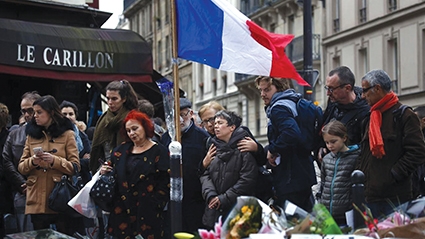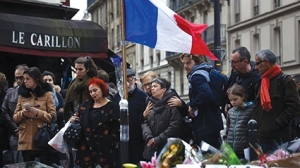Paris Attack: the European 9/11
Paris became a target of terrorists for its third time within the year of 2015. The night of 13 November is now being described as the European 9/11 as Paris, one of the European centers, was attacked by radical Islamists belonging to the so-called Islamic State (IS) terrorist group.
Several bomb blasts and shootings at different venues in Paris overnight left more than 130 citizens dead, hundreds wounded and around 100 in a critical condition.
The French President Francois Hollande described the event as an “act of war” organized by the Islamic State militant group.
The first of three explosions occurred outside the ‘Stade de France’ stadium on the northern fringes of Paris where France were playing Germany in an international football friendly. French President Francois Hollande was in attendance at the soccer match which was being broadcast on TV.
The BBC reported that a man wearing a suicide belt was reportedly prevented from entering the stadium after a routine security check detected the explosives. According to the Wall Street Journal, the man backed away from security guards and detonated the explosives, killing himself and a passer-by.
Sujin Jang, a South Korean business school Professor living in Paris told Georgia Today: “I’ve gone from feeling sad and shocked to feeling angry and determined. Obviously, the sadness and fear were overwhelming as I followed what was happening as it unfolded in real time,’ she said.
‘After that there was this sense of anger about the injustice of it all,” said Jang, adding, “but then over the weekend I visited one of the sites of the shootings- the restaurant La Belle Equipe. There I saw people from different cultures, ethnicities, religions, all crying, leaving flowers, lighting candles.... It was so sad and beautiful to see.”
Jang, who has close ties with Georgia, is convinced that the way to fight [this] is by uniting across the “obvious” boundaries that so often divide us. “By building bridges across the boundaries of race and religion and nationalities. I’m determined to contribute to that in any way I can; as a teacher, as a researcher, and as a citizen of Paris and the world,” Jang told Georgia Today.
Georgian student Luka Kurdgelia, who was attending the football match in Paris on the day of the attack with friends, told the Georgian Observer that after the explosion there was chaos; people had no idea what was happening outside.
“No one could think that the sound of the blast was a real one, we thought it was drums. Suddenly panic broke out, we saw people running for the exits from the stadium and we followed the masses. I walked outside and found complete chaos. No one knew where they were running. We could hear crying and shouting.”
The Georgian Ambassador to France, Eka Siradze-Delone, explained that no Georgian citizens were reported among the victims of the terrorist attack. In addition, the Georgian Embassy in Paris opened an emergency line for Georgian citizens in any need of assistance during and after the occurrence.
As the roots of the terrorist attack has been a topic of wider discussion worldwide, Georgia Today asked Mamuka Kudava, former Georgian Ambassador to France to provide his perspective on the matter. As Kudava explained, the war has no connection with the "clash of two Christian and Muslim civilizations” as it is frequently misinterpreted, “This is the war within the Islamic religion,” he said, adding, “relatively, there is no need to rail against all Muslims.”
Kudava offers several reasons to answer the question ‘Why Paris?’ “First, before Paris, there was London and Madrid. Second, the former French colonies of Syria and Lebanon have robust diaspora in France, which enable them to recruit some ‘Francophone” fanatics.” At the same time, the diplomat cited, “France is involved in the airstrike campaign against the IS and some terrorist groups appear to have strengthened in France.”
An initiative group held a protest in Tbilisi on Wednesday titled ‘Islam is Not Terrorism.’ Grigol Gegelia, Georgian political expert, told GT that the key message of the protest is that no religion should be interpreted as terrorism, thus Islam is not terrorism. “We have our Muslim brothers and sisters in Georgia and the problems existing stem not from the particular religion, but from radical terrorists. We Georgians should do everything to build a multicultural society,” Gegelia emphasized.
The Prime Minister of Georgia on Wednesday convened a Security and Crisis Management Council to discuss Georgia’s security environment. As the ministers of security structures declared after the meeting, Georgia is one of the world’s leading countries in terms of security and [they] will increase control in almost every aspect to limit any attempt of terrorists to enter or utilize Georgia as a corridor.
By Zviad Adzinbaia












